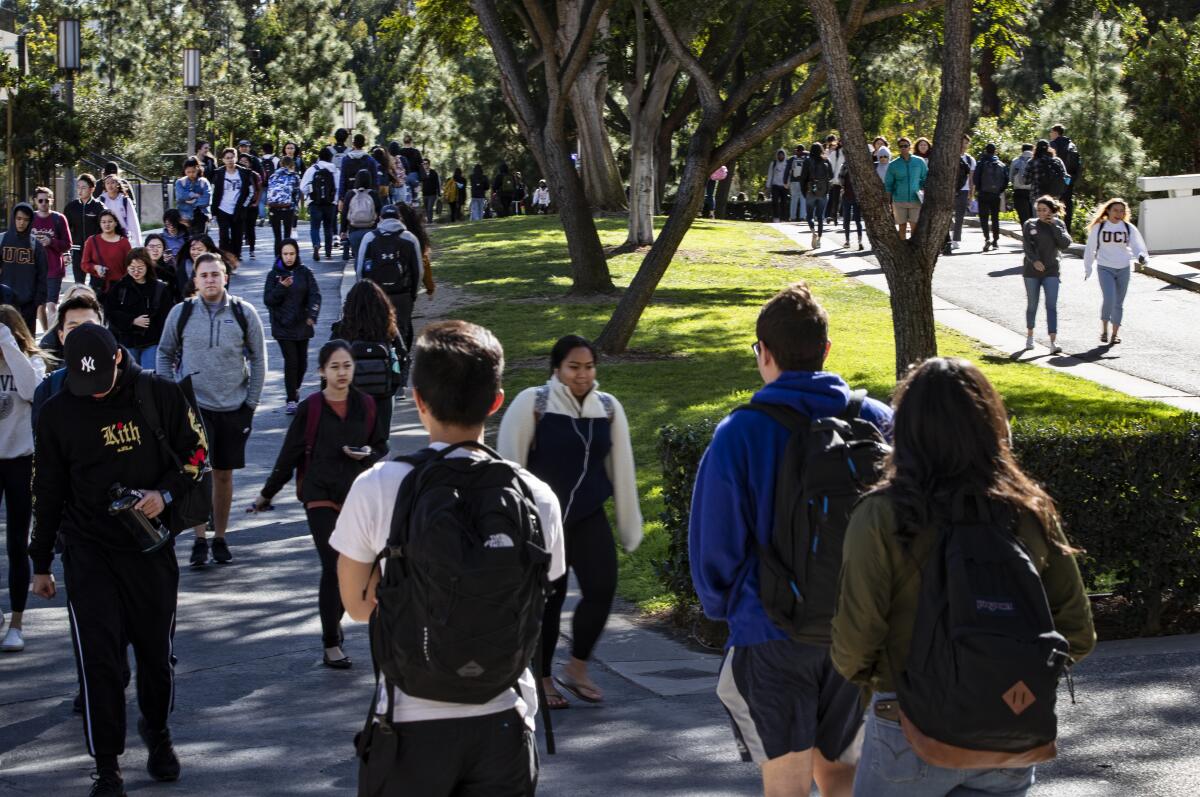Op-Ed: UC churns through a quarter of its lecturers a year. Why I was forced to move on

While UC students binge Netflix’s “Squid Games” in their dorms, most may not realize that the lecturers teaching their classes are forced into real-life high-stakes squid games: We are fighting to survive in the UC system.
Lecturers, also known as adjuncts, teach at least one-third of the classes offered for credit on UC campuses, and we often have the same credentials as our tenured colleagues. Yet our jobs are incredibly unstable: Our livelihoods are contingent upon the fluctuating needs of the university. About 25% of the lecturers don’t return to teach the next year, a cycle of perpetual turnover referred to as churning.
I am one of the churned.
As a freshly minted PhD, I was hired to teach race- and diversity-related courses at UC Irvine. I love the work I do, and I know my presence matters to my graduate and undergraduate students, most of whom are first-generation college students and BIPOC — Black, Indigenous, people of color. During the pandemic alone, I taught 1,700 students, wrote hundreds of letters of recommendation for seniors seeking jobs, internships and entry into graduate programs, and adjusted my course to respond to students’ ever-shifting needs during a racial reckoning and a devastating pandemic.
All of this extra work was unpaid. My part-time salary came with a full-time workload. My monthly pay covered only my rent. The median salary for a UC lecturer is $20,000 a year, and 25% of us rely on government assistance to secure necessities such as housing, food or healthcare. We stand on perpetually shaky ground: burdened by unpaid work, salaries too low to afford to live in the communities where we teach, and always wondering if we’ll still have a job next year.
Our union, UC-AFT, which represents approximately 6,000 lecturers across the UC system, is fighting to change that. Since April 2019, we have been in negotiations for a new contract — one that could build a bridge to a more stable future for us and our students.
Yet my students see me as someone who has already made it. “You have inspired me to go to graduate school,” they tell me. “I want to earn a PhD degree because of you,” they say, or “You are my first Latina professor.”
The UC system touts itself as an engine for social mobility and equality. It is quick to report that more than 40% of UC students are the first in their family to go to college, that UC serves a large and growing number of low-income students, that the university has enrolled a record number of students from historically underrepresented groups, who made up 43% of the entering class.
But what message does UC send when lecturers — who are much more likely than tenure-track faculty to be women, and more likely to be BIPOC — are seemingly regarded as disposable? When UC treats lecturers as gig workers, they deny students access to the mentorship crucial for student retention and success.
When a college senior emails a churned former lecturer for a letter of recommendation, the email bounces back and the letter goes unwritten. When a first-generation student asks for help navigating the university’s complex network of potentially life-changing programs such as financial aid, mental health support and academic tutoring, the brand-new lecturers who replace the churned don’t have the institutional knowledge to advise them.
So, I still meet with UC students, even though I no longer work there. How can I refuse them when they share that “for the first time they felt comfortable talking with a professor” and “they don’t have anyone else to go to”? I will continue to care deeply about my students, to invest in seeing them grow and thrive.
But when they tell me they want to pursue a PhD, I struggle to silence my concerns. I don’t want them to be relegated to the margins of academia, like so many of us are, with little to no institutional power, no job security and pay so low that many of us eventually decide we cannot even afford to teach.
By June, I was burned out from the extra duties I had taken on during the pandemic. I could no longer afford to live near my campus in Southern California and, despite my record of excellent teaching and mentorship, there was no guarantee that I would be offered courses to teach. So I was forced to move on. I blamed myself. After all my grandparents’ and parents’ sacrifices, here I was with a PhD but without stable employment. My dad always told me vas a ser rica (you’re going to be rich) once I finished my degree. The reality is I will never be able to give back to my parents. For children of immigrants, this feels like absolute failure.
UC lecturers need a fair contract, one that outlines reasonable workload standards, creates pathways to promotion, and provides fair compensation that reflects our contributions to our campus communities. Without it, we will continue to be what we have long been — a cut-rate and inhumane way for the UC system to bring skilled and experienced teachers into the classroom. We need to stop the churn.
Diane Mendoza Nevárez is a former UC lecturer who recently moved to Central California.
More to Read
A cure for the common opinion
Get thought-provoking perspectives with our weekly newsletter.
You may occasionally receive promotional content from the Los Angeles Times.










